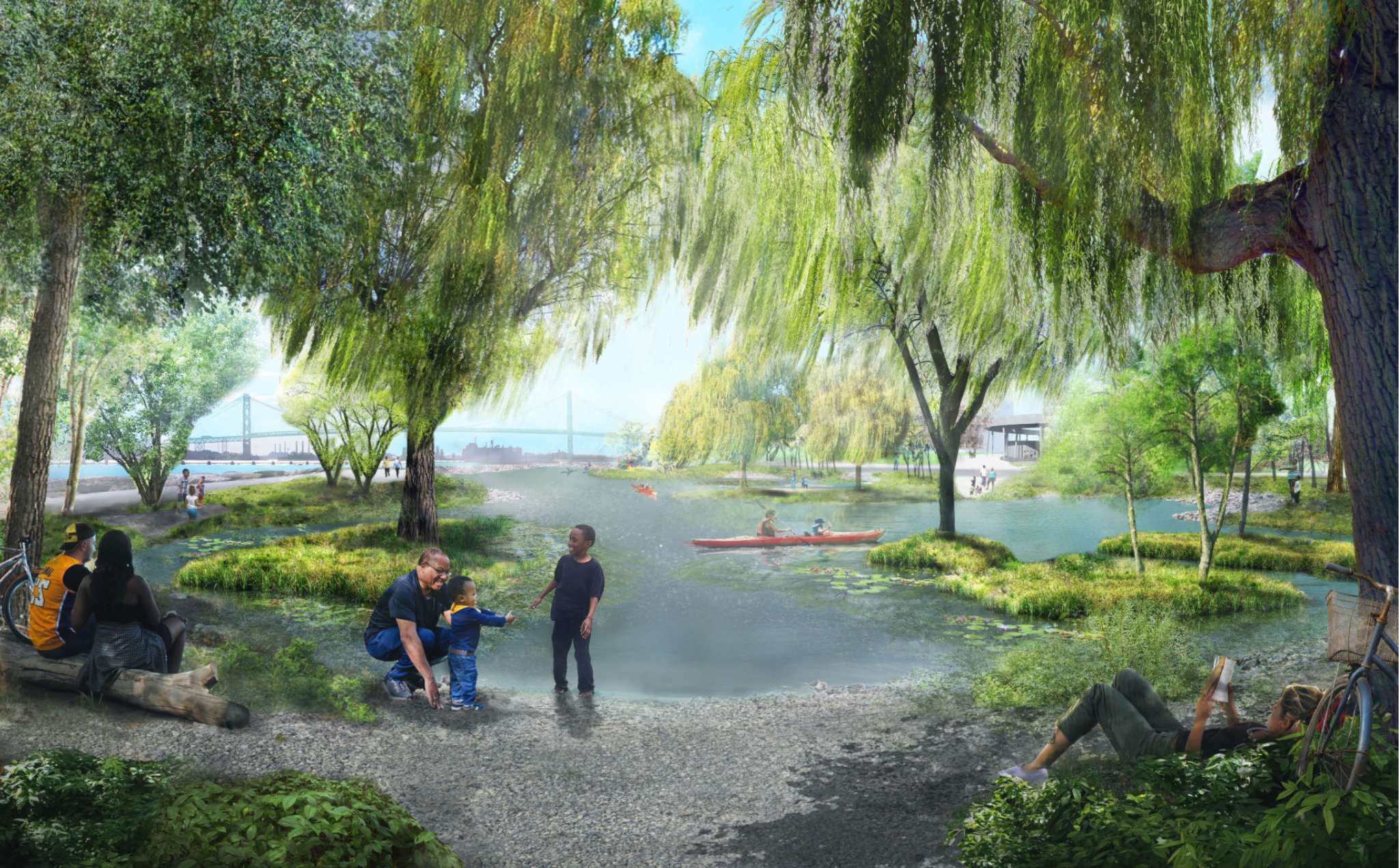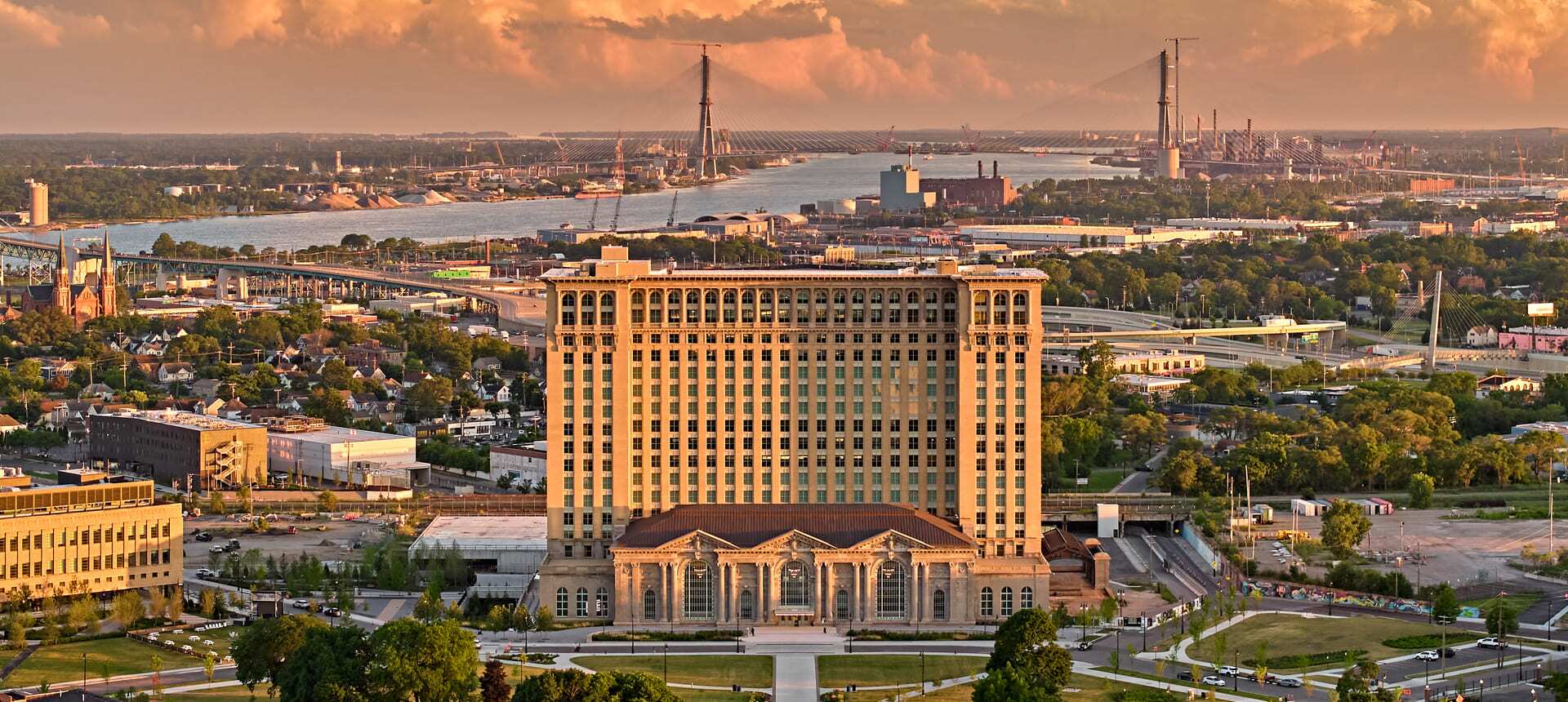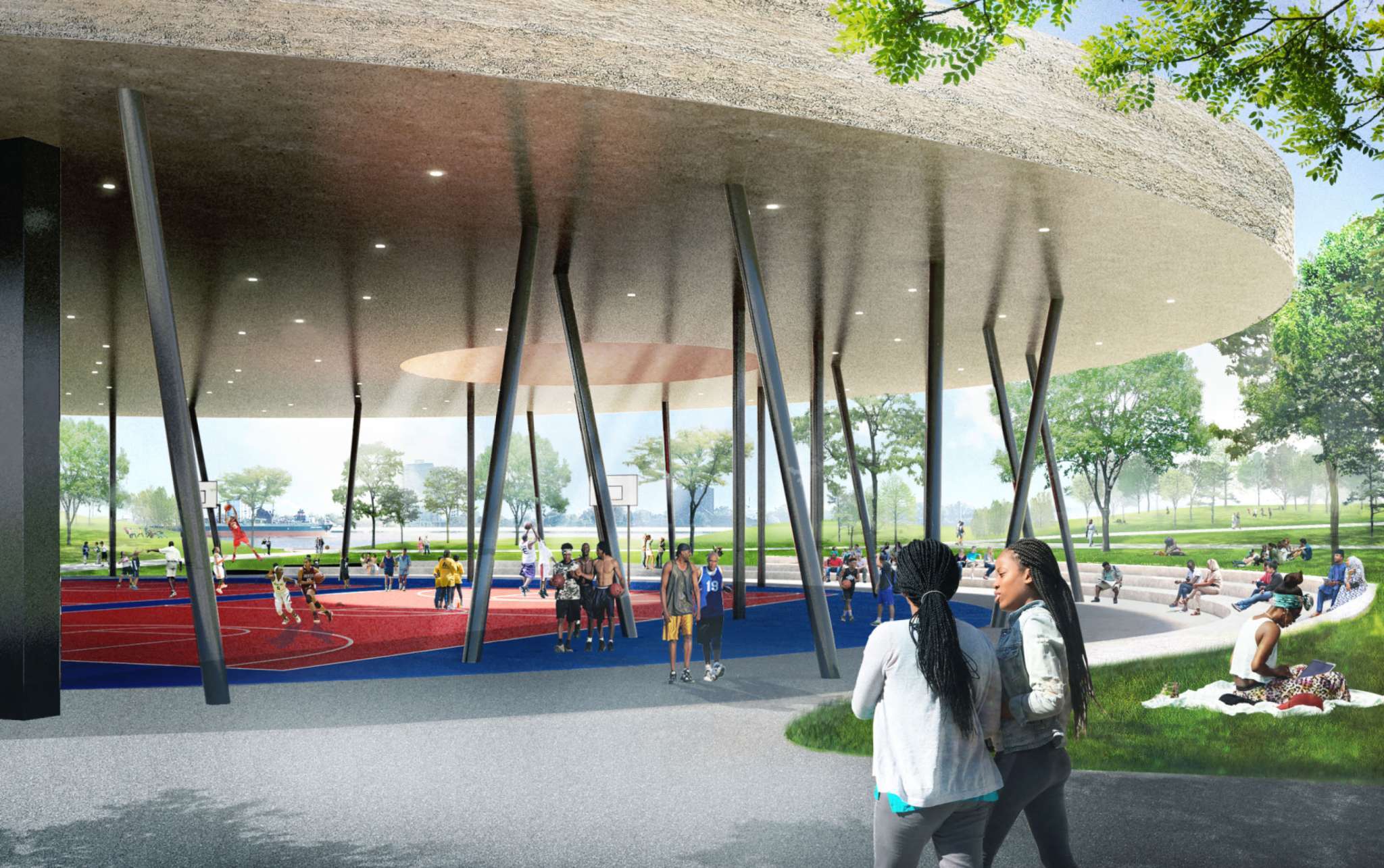Commercial developers have flocked to downtown Detroit in recent years with new restaurants, hotels and office buildings, helping to lift the city from years of economic doldrums. Now, local officials are joining like-minded peers in cities around the country in building parks to stimulate residential development to complement the new commercial amenities.
Ralph C. Wilson Jr. Centennial Park is scheduled to open in October in the Corktown neighborhood on the site of what had been neglected green space, according to the Detroit Riverfront Conservancy, a nonprofit group that manages the city’s riverfront public parks. The 22-acre Ralph Wilson Park, located along the Detroit River between Rosa Parks Boulevard and Eighth Street, features a basin connected to the river by a narrow inlet and an artificial hill intended to be used for sledding and concerts. The higher elevation created by the earthworks hill also helps the area stand out from Detroit’s otherwise flat terrain.
“We tried pretty hard to not just have another walking path along the water’s edge,” Nate Trevethan, a principal and landscape architect at Michael Van Valkenburgh Associates, told CoStar News. “We wanted to make something that would allow you to participate in both the city and the river at the same time."
The park is aimed at helping continue the resurgence of Detroit’s central business district after the city filed the largest municipal bankruptcy case in U.S. history in 2013. New parks in Atlanta, Boston and Minneapolis, among other cities, have helped spur commercial and residential development in surrounding neighborhoods. Commercial developers actively seek cities that prioritize public parks because it helps their projects attract tenants at higher rent levels, according to a report issued last year by the Trust for Public Land and the consulting firm HR&A Advisors.
Detroit Mayor Mike Duggan has touted the city's financial support for parks and other public amenities as a way to "attract even more private investment and continue the progress in these neighborhoods," according to an October statement.

Ralph Wilson Park was delayed last year after William Smith, chief financial officer of the Detroit Riverfront Conservancy, was accused of stealing $40 million from the nonprofit group. Smith last month was sentenced to 19 years in prison after pleading guilty to the accusations. After the allegations were made public, the Community Foundation of Southeast Michigan created a $35 million fund to help the Conservancy finish construction of Ralph Wilson Park. The Ralph C. Wilson Jr. Foundation made an additional $10 million contribution.
There is no guarantee that new public parks will trigger the construction of new houses and businesses. But the experience of cities such as Omaha, Nebraska, where about $2 billion of commercial developments are underway near new parks, suggests that elected officials and charitable organizations may see it as a financial risk worth taking.
Development across the city
The $75 million Ralph Wilson Park, named for the Detroit native and former Buffalo Bills owner, is surrounded by some of Detroit’s best-known landmarks — and other signs of the city's resurgence.
It’s about a mile from Renaissance Center, the modernist office-and-hotel complex that opened in the 1970s. Developers are considering plans to redevelop the complex, also known as RenCen.
The Detroit International RiverWalk, another project cited for helping stimulate commercial development, is located to the east of Renaissance Center, and Ralph Wilson Park is to the west.

Michigan Central Station, less than a mile inland, is home to Ford Motor Co. research-and-development offices after being vacant for years. Ambassador Bridge, a privately owned suspension bridge between the United States and Canada, looms nearby. Further upstream on the Detroit River, the cable-stayed Gordie Howe International Bridge is taking shape, set to open later this year.
The new park provides sweeping views of those landmarks and the Canadian city of Windsor, Ontario. It also includes recreational pavilions designed by the namesake firm of architect David Adjaye, known for his design of the National Museum of African American History and Culture in Washington, D.C. The pavilions provide space for a pool, amphitheater, outdoor events center, artist studios and basketball courts.
Foot traffic generated by the new park should help stimulate already-active commercial development in Corktown, Trevethan said. The Corktown district, along Michigan Avenue, has seen a surge of new restaurants and bars opening but a limited amount of residential development, he said.
“There is plenty of room surrounding the park for residential development,” said Trevethan. “That’s my big hope, that there is more residential development near the park to allow people to live and work in closer proximity.”

Basco Detroit recently proposed converting the former Spaulding Building at 1350 Michigan Ave. into apartments and retail, combined with a new building to be constructed next door. The 188-unit Perennial Corktown, developed by Oxford Capital Group, opened in 2023.
The design team at Michael Van Valkenburgh Associates wanted to provide multiple activity options for children and teenagers, Trevethan said. The design features a landscaped garden that surrounds the water basin, intended as a place for parents to spend time with their children, and a large playground with giant animal structures. Some local groups have begun planning for a series of educational sessions to teach children about the river and local ecology.
“We wanted to create a Great Lakes landscape where, for those who don’t have an opportunity to get to some of the outer reaches of the Great Lakes and experience a wild Michigan landscape, you can do that here,” Trevethan said.
For the record
Michael Van Valkenburgh at his namesake firm was the lead designer. Neumann/Smith was the architect of record. Utile, LimnoTech, PEA and NTH Consultants provided additional engineering and consulting services to the lead designers.
